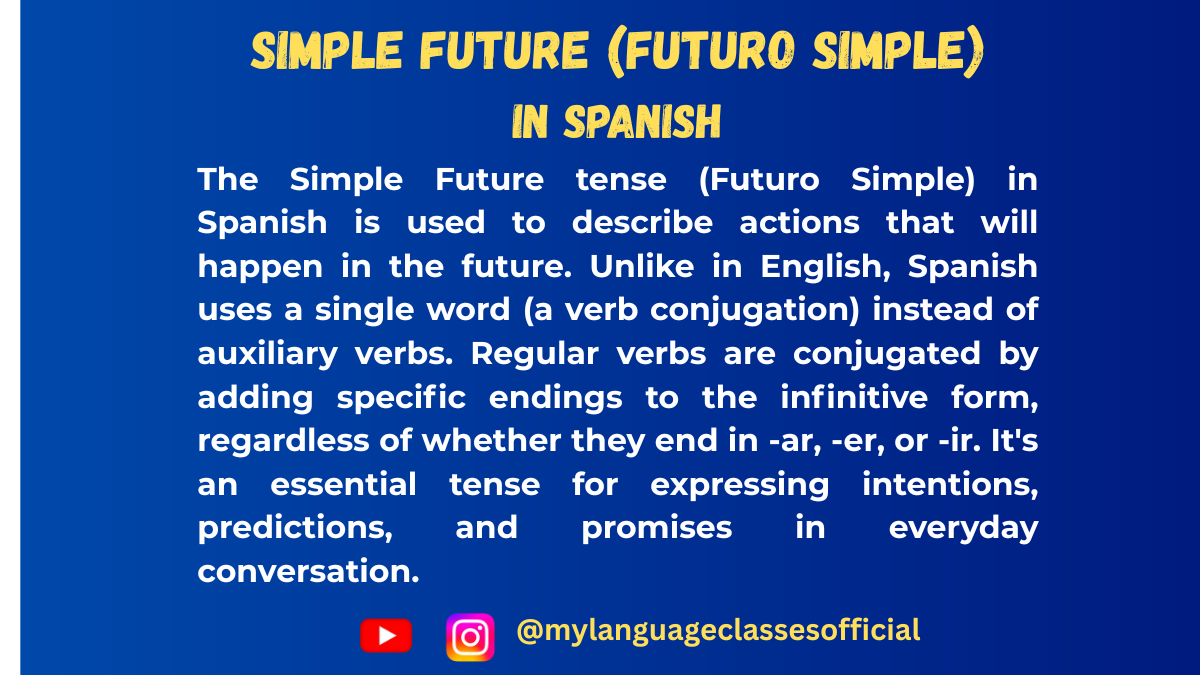Your cart is currently empty!
Tag: Spanish future tense endings
-

Simple Future (Futuro Simple) Tense/Mode in Spanish
The Simple Future tense, also known as “Futuro Simple” in Spanish, is used to talk about actions that will happen in the future. Unlike in English, where “will” is added before the verb, in Spanish, future tense is formed by adding specific endings to the infinitive form of the verb. This tense is straightforward and is commonly used in both spoken and written Spanish.
Common Expressions Using Simple Future
Here are some commonly used expressions in daily conversations that involve the Simple Future tense:
- Mañana será un gran día. – Tomorrow will be a great day.
- Nos veremos pronto. – We will see each other soon.
- Te llamaré más tarde. – I will call you later.
- Haré mi tarea después. – I will do my homework later.
- Iremos al cine esta noche. – We will go to the cinema tonight.
- Tendrás noticias mías pronto. – You will hear from me soon.
- Aprenderás español rápidamente. – You will learn Spanish quickly.
- Él llegará en cinco minutos. – He will arrive in five minutes.
- Lo entenderás con el tiempo. – You will understand it with time.
- Lloverá mañana. – It will rain tomorrow.
Things to Keep in Mind
- The infinitive form of the verb is used as the base for conjugation.
- Same endings apply to all three verb categories (-AR, -ER, -IR).
- There are no gender-based changes in conjugation.
- The plural and singular forms are indicated by the subject pronouns.
- Subject pronouns (yo, tú, él/ella/usted, nosotros/as, vosotros/as, ellos/ellas/ustedes) are optional but can be used for clarity.
- The Simple Future can also express probability or conjecture (e.g., “Serán las cinco.” – “It must be around five o’clock.”)
When to Use
The Simple Future tense is used in the following situations:
- To express future actions:
- “Mañana viajaré a España.” (Tomorrow I will travel to Spain.)
- To make predictions:
- “El clima estará soleado.” (The weather will be sunny.)
- To indicate probability or speculation:
- “¿Dónde estará Juan?” (Where could Juan be?)
- To give promises or commitments:
- “Te ayudaré con tu proyecto.” (I will help you with your project.)
- To give orders or instructions in a formal way:
- “Harás la tarea antes de salir.” (You will do the homework before going out.)
Conjugation
For regular verbs, the future tense is formed by adding the following endings to the infinitive form:
- Yo: -é
- Tú: -ás
- Él/Ella/Usted: -á
- Nosotros/as: -emos
- Vosotros/as: -éis
- Ellos/Ellas/Ustedes: -án
Regular Verb Conjugation Examples
Verb Meaning Example 1 Example 2 Hablar To speak Hablaré con mi amigo. Hablarás con el profesor. Comer To eat Comeré una pizza. Comerás en el restaurante. Vivir To live Viviré en Madrid. Viviremos en Barcelona. Escribir To write Escribiré una carta. Escribirás un correo. Bailar To dance Bailaré en la fiesta. Bailarán en el evento. Beber To drink Beberé agua. Beberemos jugo. Correr To run Correré en la mañana. Correrás en el parque. Leer To read Leeré un libro. Leerán una novela. Escuchar To listen Escucharé música. Escucharemos el podcast. Aprender To learn Aprenderé español. Aprenderemos juntos.
More Example Sentences
- Mañana estudiaré para el examen. (Tomorrow I will study for the exam.)
- ¿Vendrás a la reunión? (Will you come to the meeting?)
- Nos conoceremos en la universidad. (We will meet at the university.)
- Él comprará un coche nuevo. (He will buy a new car.)
- ¿Qué harás esta noche? (What will you do tonight?)
- Viajarán a París el próximo año. (They will travel to Paris next year.)
- Cocinaré la cena esta noche. (I will cook dinner tonight.)
- ¿Pintarás tu casa el próximo mes? (Will you paint your house next month?)
- Se despertarán temprano mañana. (They will wake up early tomorrow.)
- Trabajaré en mi proyecto este fin de semana. (I will work on my project this weekend.)
Fill in the Blanks
- Yo ______ (hablar) con mi jefe mañana.
- Nosotros ______ (viajar) a México en verano.
- ¿Tú ______ (comer) en casa hoy?
- Ella ______ (escribir) una carta a su amiga.
- Nosotros ______ (leer) el periódico en la mañana.
- ¿Vosotros ______ (correr) en la maratón?
- Ellos ______ (escuchar) la radio después de la cena.
- Tú ______ (aprender) una nueva habilidad este año.
- Él ______ (comprar) un nuevo teléfono pronto.
- ¿Ustedes ______ (beber) café en la tarde?
Answers
- hablaré
- viajaremos
- comerás
- escribirá
- leeremos
- correréis
- escucharán
- aprenderás
- comprará
- beberán
Conclusion
The Simple Future tense in Spanish is easy to learn and useful in daily conversations. By practicing regular and irregular verbs, you can master this tense and confidently talk about future events. Keep practicing with common expressions, and you’ll be fluent in no time!
If you enjoyed this lesson, be sure to check out more posts like this on my blog at My Language Classes. Don’t forget to subscribe my YouTube channel and follow me on Instagram for the latest language learning tips and lessons. Leave a comment below to share your thoughts, or ask any questions you have about nouns.
Happy learning! 😊
- 100 Spanish Example Sentences
- 100 Spanish Fill-in-the-Blanks Exercises
- 100 Spanish Vocabulary Lists
- Spanish – Advanced
- Spanish – Beginner
- Spanish – Intermediate
